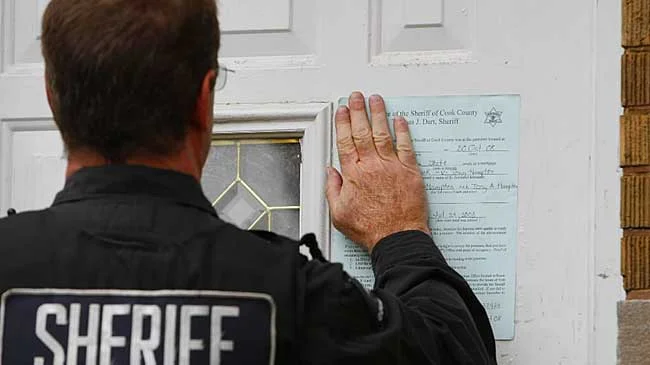Despite the local folklore about the profile and personality of defendants in eviction proceedings, most people are not repeat players in the eviction process and go through it only once in their lifetime. For anyone new to the process of eviction, it can seem confusing and overwhelming. This is a breakdown of the process, just to give the average person a sense of how things proceed in this forum, specifically in Cook County, IL.
NOTICE
Notice is a main part of many legal proceedings and evictions are no exception. All evictions begin with the landlord or the landlord’s agent giving the tenant notice. Notices can be very informal and do not need to be notarized. The notice period begins the day you receive the notice (e.g. if you are out of town and come back on the 15th to see a notice inside your door dated for the 1st, the effective date of service is the 15th, not the 1st).
The vast majority of evictions begin with a five, ten, or thirty day notice. Five day notices are for non-payment. Ten day notices are for breach of a lease term (e.g. having an unauthorized occupant or criminal activity on the property). Thirty day notices are for end of term (i.e. the lease is over). The landlord cannot file until the notice period ends.
SERVICE
Once a landlord or its agent files suit, the tenant must be served. In a large county like Cook County, service must be attempted once through the Sheriff’s office before one can use a private individual, or special process server, to serve service of process. The landlord must make good faith attempts to serve the tenant personally in the lawsuit. That process usually takes about four to six weeks. If the landlord wants a money judgment in an eviction claim, they must obtain personal or substitute service on the tenant. Service is effective when it is had on either the tenant personally or someone who lives in the tenant’s home above the age of thirteen.
If the landlord makes good faith attempts with both the Sheriff’s office and a special process server but is unable to effectuate service on a tenant, then the landlord may go forward by what is called “posting.” Posting is done by literally posting the notice in certain public buildings and mailing a summons and complaint to the tenant. If the tenant does not appear in court on the posting date, the landlord can get a judgment against the property only (also called and “in rem” judgment) without the tenant being present.
COURT
Court proceedings in eviction court are somewhat casual and many parties represent themselves. The landlord has the burden of proof. The landlord has to prove a few things:
- The have a superior right to possession of the subject property
- Proper notice was given
- The tenant unlawfully withholds possession
- There is money due (if applicable)
There are usually only a few valid defenses that a tenant may present that are a complete defense to an eviction claim:
- Notice presented is improper or was not properly served
- If the eviction is based on a non-payment claim, no money is actually due
- The landlord is retaliating against the tenant for complaining about subject property conditions or exercising another legal right
EVICTION ORDER
If the landlord is successful proving its case in court, it will receive and Eviction Order. That order is usually “stayed” one or two weeks, depending on the judge’s discretion and may or may not have a money judgment attached. After the stay date, the landlord may place the order with the Sheriff and this gives the Sheriff authority to evict. The Cook County Sheriff is extremely overloaded and evictions usually run four to six weeks behind. The sheriff will usually send a final notice, but the sheriff does not tell anyone but the landlord or its agent when they are coming.
EVICTION
When the eviction actually takes place, the Sheriff comes to the residence, removes all of the occupants with only a few personal belongings, and changes the locks. Only the Sheriff can perform the eviction. When this happens, tenants find that all of their belongings are now stuck inside a residence they no longer have keys to. This is a horrible situation because now you have to negotiate with a landlord that likely hates you to get all of your things back. There is very little protection for a tenant against property damage and theft in these cases.
* I hope this helps all of you with any questions you might have. Always feel free to contact me with any questions.

